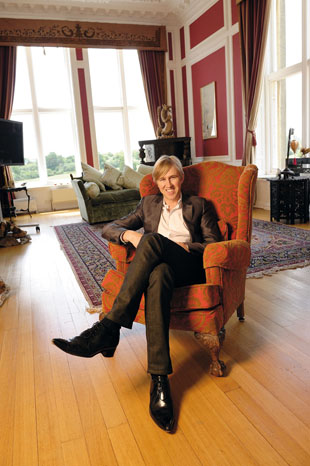Fortune Cookie's Justin Cooke
Not content with running one of Britain’s leading digital agencies, Fortune Cookie’s Justin Cooke is the new chair of the British Interactive Media Association (BIMA). He tells Oliver Lindberg about the many challenges ahead
Tumbleweed is rolling past. A call-out on Twitter to find out what your average web designer knows about BIMA, the British Interactive Media Association is met with stunned silence. Then a handful of tweets pop up: “Never even heard of them!”, “Nope, absolutely no one knows that!”, “Let us know when you find out.” It looks like Justin Cooke, BIMA’s newly elected chair and managing director of London-based digital agency, Fortune Cookie, has got one hell of a job in front of him.
“This is the whole reason for me wanting to get involved in the first place,” Cooke says. “What you’ve done on Twitter is a brilliant example of the challenge of getting BIMA recognised. There’s a big job to be done and anyone who knows me knows I like challenges. I like trying to achieve big things. I’m a great believer in what Mr Saatchi once said when he was running his agency: nothing is impossible. One of the things that most drew me to the idea was the fact that BIMA needs to re-engage with the web design, build, agency and digital marketing sector, to help position us as leaders on a global footing and showcase the world-class talent that we’ve got here in the UK.”
Britain is currently going through a huge shift that will put digital at the heart of the economy, says Cooke. It’s his view – and that of the new executive committee, which includes Rob Corradi, founder of NeonState and Preloaded, and James Bromly, managing director of Mail Online – that BIMA, as a representative of the interactive industry, needs to have a voice and a stake to make that happen. “Everybody feels the same way – that it’s time for change. We’re creating a 100-day plan that we’ll use to show that we’ve made a measurable difference to BIMA within three months. We’re all about transformation and results at Fortune Cookie and I want to take that and apply it to BIMA.”

All well and good, but what do web designers actually get out of the body? “At the very top it’s about getting to network – to meet and engage your heroes and mentors,” Cooke explains. “Last week, for example, we had Dr Jakob Nielsen speaking at BIMA, and that event was open to members. At the most basic level, it’s all about standards and documentation, tools and processes that everyone working in the industry should value. I’m talking about having a standard employment contract, for example, that’s been specifically written for web designers by a leading legal firm, which, as members, they have the ability to access. As a managing director of a digital agency I know just how useful that would be to me. It would also probably save me several hundreds, if not thousands of pounds.”
The BIMA Awards, which have been going since 1984, will also get a radical overhaul. They will start recognising designers with certificates and special branding that they can place on their websites.
Cookie’s fortune
It’s on the back of Fortune Cookie’s success that Justin Cooke has become chair of BIMA. Since its launch in 1997, the agency has gone from strength to strength. It survived the dotcom crash, regained its independence in 2007 and has managed to more than double its turnover in the last two years. Clients include Amnesty International, UEFA, Legal & General and Kenwood, while Media Momentum has ranked Fortune Cookie as one of the fastest-growing media agencies in Europe for the third consecutive year. Now it’s on track to grow another 30 per cent by April 2010 and open an office in France, the company’s first international operation.
Around 120 to 150 people is the maximum size that I’d want Fortune Cookie to be in the UK
“It’s always a challenge to retain the culture,” Cooke explains. “There are various ceilings that you reach where being able to scale beyond that is difficult. The typical numbers in an agency are probably between 20 and 50. We’re at the second stage now and have to think very carefully about how we do scale. We learn things all the time. We bring in talent from agencies and organisations larger than Fortune Cookie that can help us, we have external advisors and attend training courses. But around 120 to 150 people is the maximum size that I’d want Fortune Cookie to be in the UK.”
Plans for growth
That the agency is expanding at a time when others have to scale down is remarkable. Cooke puts it down to the experience the team gathered while going through the dotcom crash. Fortune Cookie made cutbacks and decided to concentrate on a few key sectors: travel and leisure, financial services and the media. It’s also about clear communication and staying focused. At Fortune Cookie there are very clear, measurable objectives at every level to ensure the company stays on course. Plus, the recession and the weakness of the pound present opportunities to help achieve these.
“The currency fluctuations that we’ve seen have put us, as an industry in the UK, in a very strong position to be able to go to the rest of the world,” Cooke says. “We’ve got the best design and digital talent in the world and I think the perception has been that with that quality comes a cost. The fact that we’re now 30-40 per cent cheaper than we were a year ago puts us in a really strong position to be able to go to markets where our services have always been considered to be more of a premium. There are lots of challenges and risks associated with that as well, I’m not going to hide away from that. But if we’re going to take the UK out of the situation we’re in at the moment, then international trade is one of the ways that we can do that.”
We need to look at improving conversion rates and try to apply some thinking behind how existing technology can be utilised better, rather than trying to buy new technologies to bolt on
It’s also important to adapt. During an economic downturn, you have to offer services that are focused more on efficiency and saving money than just growth. “While budgets may be cut or remain the same, we need to look at how we can make it go further, how we can make it work harder. We need to look at improving conversion rates and try to apply some thinking behind how existing technology can be utilised better, rather than trying to buy new technologies to bolt on.”
That’s not to say Fortune Cookie doesn’t heavily invest in innovation and research. For example, it was the first agency in the world to buy the new high definition eye-tracker Tobii T60XL for user testing. “I always laugh and say it’s like being the first airline to buy the new Boeing 777,” says Cooke. “We’ve also just integrated the use of smart boards to our usability testing process, so when we’re playing the outputs from the eye-tracker, we’re doing that on a huge screen. The user experience lead and client can review it and press pause using Minority Report-style gestures. It’s revolutionary.”
Fortune Cookie sees the relationships with its clients more like long-term partnerships. So the client is closely involved in the user testing process and invited to witness first-hand how potential users will navigate its site. “The goal is always to get the board on board. We find out who’s the trickiest client stakeholder, get them in and let them see their customers trying to engage with their brand. Typically, they watch the tracking and testing and come out your biggest fan.”
The agency juggles up to 20 accounts at any one time, and every account has a champion across the company for every discipline (for example, a creative brand champion, or a user experience champion). Certain projects are labelled ‘halo projects’, which are exciting, innovative and new. One such project was the Legal & General Home Contents Calculator, which enables you to fly around the house calculating the value of your household possessions.
According to Cooke, the future looks bright. He believes conversion rates will double again and again, and the prospect of being able to do so fills him with excitement. If Justin Cooke manages to be only half as successful as chair of BIMA as he is with Fortune Cookie, we’ll hear more about BIMA in the months to come. A lot more.

Thank you for reading 5 articles this month* Join now for unlimited access
Enjoy your first month for just £1 / $1 / €1
*Read 5 free articles per month without a subscription

Join now for unlimited access
Try first month for just £1 / $1 / €1
Get the Creative Bloq Newsletter
Daily design news, reviews, how-tos and more, as picked by the editors.

The Creative Bloq team is made up of a group of art and design enthusiasts, and has changed and evolved since Creative Bloq began back in 2012. The current website team consists of eight full-time members of staff: Editor Georgia Coggan, Deputy Editor Rosie Hilder, Ecommerce Editor Beren Neale, Senior News Editor Daniel Piper, Editor, Digital Art and 3D Ian Dean, Tech Reviews Editor Erlingur Einarsson, Ecommerce Writer Beth Nicholls and Staff Writer Natalie Fear, as well as a roster of freelancers from around the world. The ImagineFX magazine team also pitch in, ensuring that content from leading digital art publication ImagineFX is represented on Creative Bloq.
